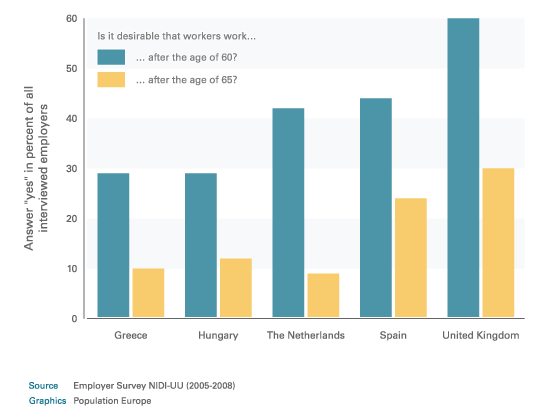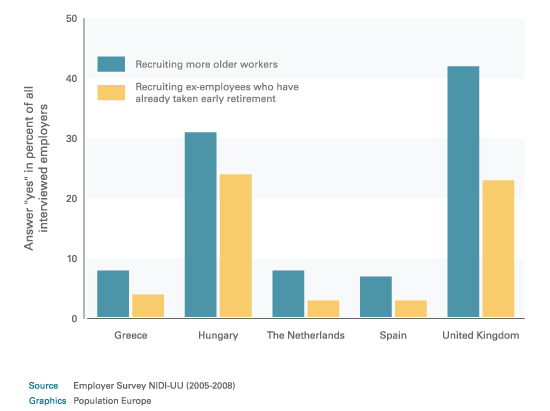Working longer and retiring later is not only a matter of whether older individuals want to remain active in the labour market as long as possible, but also depends on the employersˆ capacity and willingness to employ and retain older workers. A recent study by Hendrik P. van Dalen, Kne Henkens, Wilma Henderikse, and Joop Schippers analyses whether European employers support later retirement.
In times of ageing populations, the governments of European countries fear rising costs of public pensions as well as looming labour shortages. In order to cope with these challenges, they have adopted policies to delay retirement and support the labour force participation of older workers. Employers’ efforts to integrate older workers into their workforce is a crucial component of prolonged labour activity. The effectiveness of pension reforms that limit early exits from the labour market, legislation targeting age discrimination and public campaigns combating negative stereotyping all hinge upon the support of employers. The analysis carried out by four Dutch researchers compares employers’ opinions and expectations about an ageing workforce and postponing retirement across five European countries: Greece, Hungary, Spain, The Netherlands and the United Kingdom.
British and Hungarian bosses are the most optimistic
Across all five countries, 60 percent or more of the surveyed employers associate an older workforce with more know-how and experience. Nevertheless, many more employers expect increases in labour costs than expect increases in productivity. This leads the researchers to the conclusion that most of the surveyed employers perceive work force ageing as a burden rather than as an opportunity.
A more detailed country by country analysis reveals that British and Hungarian employers are more positive towards older workers than their counterparts in Greece, The Netherlands and Spain. In these three countries about half of the employers interviewed fear not only higher labour costs, but also increases in absenteeism or sick leave. They also think that older workers are more resistant to change and have less enthusiasm for new technology.
Weak support for later retirement
Do employers encourage their employees to retire later, recruit older workers or allow their employees to work beyond the age of 65? In Greece and Hungary, less than 30 percent of the surveyed employers think that workers should continue in employment after the age of 60 years (figure 1). An even lower share of employers in these countries supports working beyond the age of 65, whereas in the United Kingdom, almost a third would encourage older workers to remain in the labour market, including those who have reached the (male) statutory retirement age of 65 years.

Figure 1 – Opinions of employers on the timing of retirement within their own organization.
Recruiting a higher percentage of older workers or re-recruiting former employees who have already retired seem to be realistic options only for employers in Hungary and the United Kingdom (see figure 2). In the other three countries, less than 10 percent of employers rely on these strategies to cope with personnel shortages.

Figure 2 – Measures taken by employers to cope with personnel shortages (in per cent).
Instead of switching from full-time career to full-time retirement, part-time work can contribute to the transfer of knowledge and experience to younger employees. At the same time it can help to deal with the desire of the older worker to reduce their work stress and enjoy more leisure time. Almost half of the employers in The Netherlands and a third in the United Kingdom offer such possibilities for gradual retirement to their older workers, whereas in Spain and Greece, this is only the case for about 10 percent of the surveyed employers.
Policy makers have yet to convince employers
In conclusion, in most countries except the United Kingdom, support for later retirement is weak, in particular regarding extending working life beyond the age of 65. Most employers perceive ageing work forces as a burden rather than as a chance to embrace the challenges of ageing societies.
The authors of the study suggest that most employers will not take on an active role in extending the working life. There remains a clear discrepancy between the policy efforts undertaken at the level of the European Union and member state countries to stimulate the labour force participation of older workers, and the willingness of individual employers to allow workers to extend their working lives.
This volume has been published with financial support of the European Union in the framework of Population Europe.